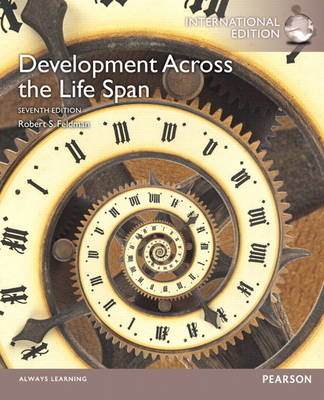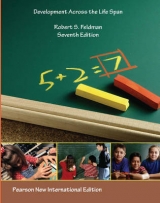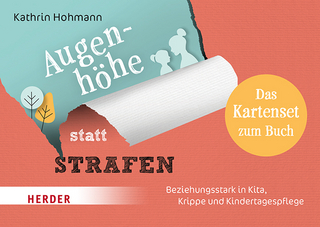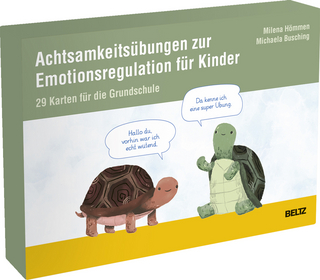
Developement Across the Life Span, plus MyDevelopmentLab with Pearson eText
Pearson Education Limited
978-1-4479-5357-9 (ISBN)
- Titel erscheint in neuer Auflage
- Artikel merken
Offers a strong balance between research and applications.
Robert Feldman offers students a chronological overview of physical, cognitive, social, and emotional development-from conception through death with his text Development Across the Life Span. This best-selling text presents up-to-date coverage of theory and research, with an emphasis on the application of these concepts by students in their personal-and future professional-lives. The text taps into students' inherent interest in the subject of human development, encouraging them to draw connections between the material and their own experiences.
MyDevelopmentLab is an integral part of the Feldman program. Key learning applications include, MyDevelopmentLab video series, MyVirtualLife, and MyVirtualChild.
This text is available in a variety of formats - digital and print. Pearson offers its titles on the devices students love through Pearson's MyLab products, CourseSmart, Amazon, and more. To learn more about our programs, pricing options and customization, click the Choices tab.
Teaching & Learning Experience
Personalize Learning - MyDevelopmentLab is an online homework, tutorial, and assessment program. It helps students prepare for class and instructor gauge individual and class performance.
Improve Critical Thinking - Review and Apply sections - Consist of short recaps of the chapters' main points, followed by questions designed to provoke critical thinking.
Engage Students - Chapter Opening Prologues - Describe an individual or situation that is relevant to the basic developmental issues being addressed in the chapter.
Explore Research - From Research to Practice boxes - Describe a contemporary developmental research topic.
Support Instructors - A number of Instructor Resources including PowerPoint Presentations, MyTest Test Bank, and Instructor's Manual.
MyLab and Mastering from Pearson improve results for students and educators. Used by over ten million students, they effectively engage learners at every stage.
MyDevelopmentLab is being used in universities all over the world to improve student performance. MyDevelopmentLab has immersive content and engaging tools, along with time-saving automatic grading. "MyPsychLab and MyDevelopmentLab are the best tools I have ever used. [...] I now have access to every imaginable resource needed to teach and administer a psychology course! Also, I have found the customized study plan to be very beneficial because it identifies the areas of weakness and strength to focus my students' attention and efforts where they are needed the most." - Teresa Stalvey, Florida, USA
With MyDevelopmentLab, students gain knowledge that they will use throughout their lives, and universities gain a partner deeply committed to helping students and educators achieve their goals.
For students
Pearson eText gives you access to an eBook that can be used on the go, and allows you to highlight, search and take notes as you read online. Access to the eBook depends on the package you have bought.
MyVirtualChild, contained in MyDevelopmentLab, is an interactive simulation in which you raise a child from birth to adulthood, monitoring the effects of your parenting decisions and thinking critically about the developmental process.
The Personalised study plan gives you the opportunity to test yourself on key concepts and skills and generates a study plan based on topics you have not yet mastered. The study plan links to interactive exercises with guidance, to give you help when you need it most.
For educators
Online assignments, tests, quizzes can be easily created and assigned to students.
Gradebook: Assignments are automatically graded and visible at a glance.
Register now to benefit from these resources.
A student access code card is included with your textbook at a reduced cost. To register with your code, visit www.mydevelopmentlab.com.
For educator access, contact your Pearson account manager. To find out who your account manager is, visit www.pearsoned.co.uk/replocator
For more instructor resources available with this title, visit www.pearsoned.co.uk
Robert S. Feldman is Professor of Psychology and Associate Dean of the College of Social and Behavioral Sciences at the University of Massachusetts at Amherst. A recipient of the College Distinguished Teacher Award, he teaches psychology classes ranging in size from 15 to nearly 500 students. During the course of more than two decades as a college instructor, he has taught both undergraduate and graduate courses at Mount Holyoke College, Wesleyan University, Virginia Commonwealth University, in addition to the University of Massachusetts.Professor Feldman, who initiated the Minority Mentoring Program at the University of Massachusetts, also has served as a Hewlett Teaching Fellow and Senior Online Teaching Fellow. He initiated distance learning courses in psychology at the University of Massachusetts A Fellow of both the American Psychological Association and the Association for Psychological Science, Professor Feldman received a B.A. with High Honors from Wesleyan University and an M.S. and Ph.D. from the University of Wisconsin-Madison. He is a winner of a Fulbright Senior Research Scholar and Lecturer award, and he has written more than 100 books, book chapters, and scientific articles. He has edited Development of Nonverbal Behavior in Children (Springer-Verlag), Applications of Nonverbal Behavioral Theory and Research (Erlbaum), and co-edited Fundamentals of Nonverbal Behavior (Cambridge University Press). He is also author of Child Development, Understanding Psychology, and P.O.W.E.R. Learning: Strategies for Success in College and Life. His books have been translated into a number of languages, including Spanish, French, Portuguese, Dutch, Chinese, and Japanese. His research interests include honesty and deception in everyday life and the use of nonverbal behavior in impression management, and his research has been supported by grants from the National Institute of Mental Health and the National Institute on Disabilities and Rehabilitation Research. Professor Feldman loves music, is an enthusiastic pianist, and enjoys cooking and traveling. He has three children, and he and his wife, a psychologist, live in Amherst, Massachusetts, in a home overlooking the Holyoke mountain range.
1. Brief Table of Contents
Part 1 Beginnings
Chapter 1: An Introduction to Lifespan Development
Chapter 2: The Start of Life: Prenatal Development
Chapter 3: Birth and the Newborn Infant
Part 2 Infancy: Forming the Foundations of Life
Chapter 4: Physical Development in Infancy
Chapter 5: Cognitive Development in Infancy
Chapter 6: Social and Personality Development in Infancy
Part 3 The Preschool Years
Chapter 7: Physicaland Cognitive Development in the Preschool Years
Chapter 8: Social and Personality Development in the Preschool Years
Part 4 The Middle Childhood Years
Chapter 9: Physical and Cognitive Development in Middle Childhood
Chapter 10: Social and Personality Development in Middle Childhood
Part 5 Adolescence
Chapter 11: Physical and Cognitive Development in Adolescence
Chapter 12: Social and Personality Development in Adolescence
Part 6 E arly Adulthood
Chapter 13: Physical and Cognitive Development in Early Adulthood
Chapter 14: Social and Personality Development in Early Adulthood
Part 7 Middle Adulthood
Chapter 15: Physical and Cognitive Development in Middle Adulthood
Chapter 16: Social and Personality Development in Middle Adulthood
Part 8 Late Adulthood
Chapter 17: Physical and Cognitive Development in Late Adulthood
Chapter 18: Social and Personality Development in Late Adulthood
Part 9 Endings
Chapter 19: Death and Dying
2. Full Table of Contents
Part 1 Beginnings
Chapter 1: An Introduction to Lifespan Development
An Orientation to Lifespan Development
Key Issues and Questions: Determining the Nature-and Nurture-of Lifespan Development
Theoretical Perspectives on Lifespan Development
Research Methods
Chapter 2: The Start of Life: Prenatal Development
Earliest Development
The Interaction of Heredity and Environment
Prenatal Growth and Change
Chapter 3: Birth and the Newborn Infant
Birth
Birth Complications
The Competent Newborn
Part 2 Infancy: Forming the Foundations of Life
Chapter 4: Physical Development in Infancy
Growth and Stability
Motor Development
The Development of the Senses
Chapter 5: Cognitive Development in Infancy
Piaget's Approach to Cognitive Development
Information Processing Approaches to Cognitive Development
The Roots of Language
Chapter 6: Social and Personality Development in Infancy
Developing the Roots of Sociability
Forming Relationships
Differences among Infants
Part 3 The Preschool Years
Chapter 7: Physicaland Cognitive Development in the Preschool Years
Physical Growth
Intellectual Development
The Growth of Language and Learning
Chapter 8: Social and Personality Development in the Preschool Years
Forming a Sense of Self
Friends and Family: Preschoolers' Social Lives
Moral Development and Aggression
Part 4 The Middle Childhood Years
Chapter 9: Physical and Cognitive Development in Middle Childhood
Physical Development
Intellectual Development
Schooling: The Three Rs (and More) of Middle Childhood
Chapter 10: Social and Personality Development in Middle Childhood
The Developing Self
Relationships: Building Friendship in Middle Childhood
Family and School: Shaping Children's Behavior in Middle Childhood
Part 5 Adolescence
Chapter 11: Physical and Cognitive Development in Adolescence
Physical Maturation
Cognitive Development and Schooling
Threats to Adolescents' Well-Being
Chapter 12: Social and Personality Development in Adolescence
Identity: Asking "Who Am I?"
Relationships: Family and Friends
Dating, Sexual Behavior, and Teenage Pregnancy
Part 6 Early Adulthood
Chapter 13: Physical and Cognitive Development in Early Adulthood
Physical Development
Cognitive Development
College: Pursuing Higher Education
Chapter 14: Social and Personality Development in Early Adulthood
Forging Relationships: Intimacy, Liking, and Loving During Early Adulthood
The Course of Relationships
Work: Choosing and Embarking on a Career
Part 7 Middle Adulthood
Chapter 15: Physical and Cognitive Development in Middle Adulthood
Physical Development
Health
Cognitive Development
Chapter 16: Social and Personality Development in Middle Adulthood
Personality Development
Relationships: Family in Middle Age
Work and Leisure
Part 8 Late Adulthood
Chapter 17: Physical and Cognitive Development in Late Adulthood
Physical Development in Late Adulthood
Health and Wellness in Late Adulthood
Cognitive Development in Late Adulthood
Chapter 18: Social and Personality Development in Late Adulthood
Personality Development and Successful Aging
The Daily Life of Late Adulthood
Relationships: Old and New
Part 9 Endings
Chapter 19: Death and Dying
Dying and Death Across the Life Span
Confronting Death
Grief and Bereavement
| Erscheint lt. Verlag | 25.4.2013 |
|---|---|
| Verlagsort | Harlow |
| Sprache | englisch |
| Maße | 228 x 275 mm |
| Gewicht | 1453 g |
| Themenwelt | Geisteswissenschaften ► Psychologie ► Entwicklungspsychologie |
| ISBN-10 | 1-4479-5357-6 / 1447953576 |
| ISBN-13 | 978-1-4479-5357-9 / 9781447953579 |
| Zustand | Neuware |
| Haben Sie eine Frage zum Produkt? |
aus dem Bereich



